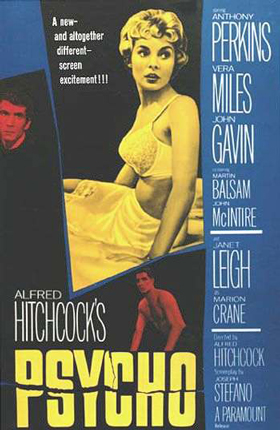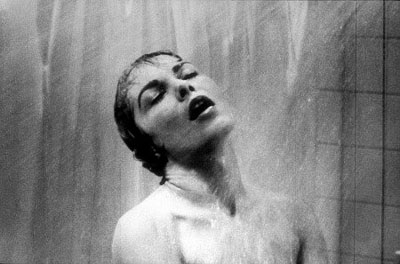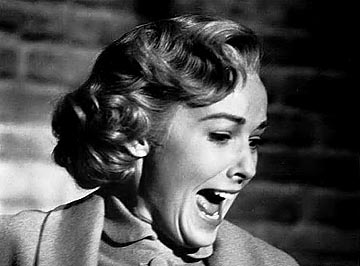
 |
|
|
|
Well, they finally got Psycho right! Universal's new Blu-ray corrects the disappointing transfers of older DVDs. The first DVD was not enhanced for widescreen and was also mis-framed. The latest DVD looked unusually soft and indistinct. The new Hi Def version straightens out these anomalies and dazzles us with its sharp rendering of the crisply shot B&W original. Reviewers often remind us that Psycho was a low-budget production filmed by Alfred Hitchcock's TV outfit, Shamley. But on a big screen in a good print it communicated a very specific experience. The interior of the Bates house somehow captured the dry desert feel and even the smell I remembered from my grandmother's house in Nevada. The air has the slightest tinge of dust particles, and after a while the flowered wallpaper patterns seems to crawl on their own. 
Alfred Hitchcock was one of the first film directors to be canonized by the Auteur Theory, a critical approach that fits his career like a glove provided one ignores the work of dozens of fine writers. Raymond Durgnat and Robin Wood wrote incisive essays about Hitchcock's long chain of masterpieces. Robin Wood's analysis of Psycho still reads the best. He begins by stating that the film is a bona fide work of art to stand beside Shakespeare's MacBeth, and by the time he's elucidated his themes of guilt transference, subjective entrapment of the viewer and post-Freudian angst, we're in total agreement. The pathetic Norman Bates has lost control of his personality. He's not the only one caught in the "personal traps" that everyone seems to share, with Marion Crane and Sam Loomis struggling in financial woes. In her nothing job Marion watches a parade of money paying for the happiness of others, especially a rich client (Frank Albertson, the "Hee-Haw" joker from It's a Wonderful Life). Sam has inherited his father's debt as if it were a gothic curse, and is forced to live in the back room of his hardware store. The fact that Norman Bates' motel has been bypassed by progress is only a symptom. He's been cursed by a back-story welter of sex and violence: a dominating parent was just too much strain on Norman's mind. Many people fear death, when they should fear the loss of psychological liberty. The psychological possession of human beings is very real, and the logical successor to hysterical religious explanations of mental illness. Back in 1960 the instant diagnosis concocted by the psychiatrist (Simon Oakland) sounded like clinical voodoo, but the audience needed it anyway. After Psycho we'd fear the boy next door, not demons that go bump in the night. The independent, foolhardy Marion Crane never realizes what horror awaits her, and neither does her tough-minded sister Lila (Vera Miles) or her boyfriend Sam (John Gavin). Hitchcock dispenses with the 'official investigation' subplot as we watch the likable Arbogast (Martin Balsam) wander into the same deadly trap. Political Science Fiction initiated the idea of random paranoia, but movies like Psycho made paranoia personal. Madness could hide behind "normal behavior". Does your teacher look at you funny sometimes? Who's that walking behind you? Hitchcock chose to make Psycho for a number of reasons, beginning with a desire to make a truly frightening horror film. The director knew producer Val Lewton, and seems to have admired Lewton's modest, impressive horror films at RKO. Whether it's fair to say that Lewton influenced Hitchcock, I don't know. We're also told that Hitchcock purposely concocted Psycho to trump the pretender William Castle, the showman that used Hitchcock-like personal appearances in his movies and trailers to promote himself as the King of Horror. If there really was a contest, Hitchcock had nothing to prove. Psycho blows Castle's modest chillers out of the water in every department, and is a transcendant work of art to boot. 
Hitchcock dropped Technicolor and Vistavision and the giant studio glamour machine for this film but he didn't short-change his cinematics. His designed and storyboarded set piece sequences are executed with far too much élan to be mere panels in a graphic novel. The shower scene is a monument of montage wizardry and filmmaker's bluff. We DO see a knife in contact with Marion's skin and we DO see part of a breast or two, despite what anybody may claim. While Hitchcock had the experts arguing about body parts, audiences were assaulted by the most graphic sequence of sex-associated violence ever. That distinction probably held until the ratings system came in eight years later, at least with mainstream studio pictures. Hitchcock also retained the irreplaceable services of composer Bernard Herrmann, whose nervous music seems attuned to the shiver zone in one's spinal cord, the tingly nerves connected to the hair on the back of the neck. In so-so pictures like Garden of Evil, Herrmann's music frequently usurped the narrative function, creating drama when the script or direction fell flat. For Psycho's frequent patches of dialogue-free suspense, Herrmann's music plays viewers like a musical instrument, expressing anxiety when Lila backs away from menace, and bearing down when she dares to approach. The days are gone when a large audience could enjoy Psycho together as virgin viewers, and I wish I could convey the chemistry in the theater when this movie grabbed us all by the throat. What Psycho possesses that all but a few horror films do not is genuine profundity. The Exorcist's shocks are purely mechanical, and in its road show release they were driven home with loud noises that battered down the resistance of the viewer. The brilliant concepts in Michael Powell's Peeping Tom, a parallel work of by another eccentric Englishman, are expressed in a mostly cerebral thread of intellectual jokes and cinematic mischief. Psycho has its own blend of graveyard humor, but its most disturbing themes are borne by its visual dimension. As Robin Wood explains, the focus is on eyes, and the film's modus operandi is to continually push forward in search of unknown horrors. The eyes of the stuffed birds are dead, and stare without seeing; the State Trooper's reflective sunglasses make him an emotionless judge of Marion's suspicious behavior. Mrs. Bates' hollow eyes are lifeless black pits that reflect Lila's fear back in her face. Robin Wood points out the most horrible eye of all, Marion's staring pupil that says, "What happened?" or "I was once alive, look at me now" or "You're next, every last one of you". It's a sympathetic eye that 'weeps a teardrop' even after Marion is gone. Hitchcock's moving camera has been leading us toward horror, pulling and pushing us into the spooky house, into its rooms with their dirty secrets. Robin Wood notes that the view of Marion's giant frozen pupil dissolves to a screen filling retreat from a macro close-up of the bathtub's drain. Where does all life go? What's the ultimate end for our hopes and desires? Hitchcock's visuals are examples of genuinely profound cinematic storytelling -- a narrative language distinct from literary expression. Real cinema is visual music; its chain of images can summon specific idea-associations, like poetry. 1 
The film's finale in the holding cell expresses cosmic alienation as strongly as does the alien hotel room in Kubrick's 2001. Norman Bates is there, but he's not really there: Norman has retreated to a safe corner of his skull. His protective mother has come forward to mind the front door and "fool" all those menacing creatures outside. The room is featureless, an endless limbo in which solitude will continue forever. The only other presence is a fly, a reminder of ugliness and decay. Hitchcock has taken us to the bitter end, beyond understanding. Sam and Lila have survived but feel utterly defeated, and a clinical explanation for the horror isn't going to make any of it any better. Psycho is Hitchcock's scary greeting card for the new Age of Anxiety. Universal's Psycho Blu-ray presents Hitchcock's most shocking film in a terrific HD presentation. The one new feature promoted on the package is a 5.1 digital remix. Mono tracks are present in English and French. The single disc contains all of the extras (and there are a lot of them) from the earlier special edition DVDs. Laurent Bouzereau's feature-length docu explores the film's genesis, production and impact from all angles and includes input from its writers, technicians and star Janet Leigh. This is the docu that explains the censored "bra" shot illustrated in the interview book by Francois Truffaut. Another extra includes excerpts from Truffaut's audio interviews with Hitchcock. A "legacy" extra presents contemporary directors (some more worthy than others) testifying to the influence of the Master of Suspense. A couple of featurettes further pick apart the shower scene, while an interesting newsreel extra shows the gigantic theater facade heralding the film's first-run New York engagement. We also get galleries of stills and advertising art. The commentary duties are performed by the capable Stephen Rebello, author of Alfred Hitchcock and the Making of Psycho. This Psycho Blu-ray is a very welcome disc indeed. The rumor on the street is that Univeral's next Hitchcock BD release will be The Birds.
On a scale of Excellent, Good, Fair, and Poor,
Psycho Blu-ray rates:
Footnote:
1. I repeat the name Robin Wood because I do not want to imply that his observations and interpretations are my own. There are a score of worthwhile scholarly books on Hitchcock and Psycho. I urge interested parties not to skip Robin Wood's book.
Reviews on the Savant main site have additional credits information and are often updated and annotated with reader input and graphics. Also, don't forget the 2010 Savant Wish List. T'was Ever Thus.
Review Staff | About DVD Talk | Newsletter Subscribe | Join DVD Talk Forum |
| ||||||||||||||||||